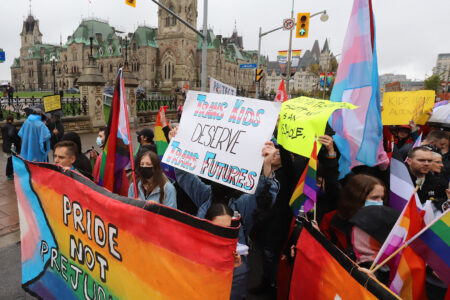
Last week, Mr Justice Rothstein announced that he will retire from the Supreme Court of Canada on 31 August 2015. This has sparked a great deal of idle speculation as to who might replace him on the Court. So I’m going to add to it. What follows are some preliminary thoughts. Along the way, I will reference (or obliquely allude to) some of the names I’ve heard in one corner or another. Oddsmakers and bookies, take note.
1. There are a number of conventions that guide the appointment of Supreme Court judges. In particular, as many commentators have already observed, one would ordinarily expect that the next appointment will come from Saskatchewan, which has not had a representative on the Court since Emmett Hall retired in 1973. That makes for a good starting-point. On this basis, many reach for the names of Chief Justice Richards and Justice Georgina Jackson as possible front-runners. But…
2. I would not want to bet the farm that this government will follow conventional wisdom concerning how judicial appointments should be made. That is not just because of the Nadon debacle. (After all, there was a genuine issue as to whether s. 6 of the Supreme Court Act precluded Quebec appointments from the Federal Courts.) More compelling evidence is the short-list leaked to Sean Fine last year, which featured a number of eyebrow-raising names, and demonstrated a willingness to depart from the advice provided by the legal profession. The appointment of Mainville JA from the Federal Court of Appeal to the Quebec Court of Appeal was perceived (not unreasonably) by some as a way of making him eligible for the Supreme Court of Canada once LeBel J. retired. There was nothing unlawful about that appointment, and indeed Mainville JA would be a solid addition to the Court. The perception among some onlookers, though, is that the government was attempting to do an end-run around the Supreme Court’s ruling in Nadon, and that it was willing to exploit a legal grey zone to do it. Rocco Galati’s challenge to Mainville’s eligibility for the appointment to the Quebec Court of Appeal probably means that we will never know what the government’s intentions really were. But the smell lingers.
3. If there is a convention that the next appointment should come from Saskatchewan, it is hardly rock-solid – and arguably shouldn’t be. The very fact that the last four Western Canadian appointments have come from Manitoba and Alberta could be taken as evidence that no such convention exists. (Such is the nature of conventions: they guide until they don’t.) So a government that is prepared to push against the boundaries of convention, or game them somewhat, can credibly say that it is not bound to make its next selection from a Saskatchewan pool.
4. I have heard it suggested that, in deciding to retire on August 31st, Mr Justice Rothstein was trying to make a statement. Rather than wait until after the federal election on October 19th, he chose to guarantee the Conservative government another judicial appointment. Coming fresh on the heels of several rulings in which he issued or signed on to vigorous dissents (here and here) all but accusing his colleagues of ”˜judicial activism’, the temptation is to see this as a public rebuke of the Court’s record in recent years.
But Mr Justice Rothstein also gave the Conservative government an interesting problem. With an election immediately following the new appointment, it may be that politics guides and constrains the government more than convention. Three points spring instantly to mind. First, candidates with impeccable conservative credentials may be, practically speaking, off the proverbial table if they cannot instantly be packaged as credible judges. Realistically, someone like Mr Justice Vic Toews is too hot a political potato – at least right before an election.
Second, even if Prime Minister Harper is prepared not to appoint someone from Saskatchewan, he is probably not prepared to ignore Western Canada altogether and risk alienating his political base. So those who think that Mr Justice Mainville’s path to the Supreme Court has been cleared should probably think again. Realistically, we would be looking at a candidate from Alberta. Mr Justice Russell Brown and Mr Justice Slatter are often mentioned. Mr Justice Thomas Wakeling, who has roots in Saskatchewan, might be an interesting compromise candidate.
Third, this would be a good time for Prime Minister Harper to answer some of his critics, and add to the racial or ethnic diversity of the Court – especially if the candidate can be packaged as someone attractive to his conservative base. I don’t want to risk stigmatizing anyone as a ”˜diversity hire’, but there are certainly a few viable candidates – and they do not include anyone I have mentioned so far.
One could argue that these observations are true for any appointment. My point is that the timing of this appointment will make it more visible. There will be less time to explain away a contentious selection. I don’t think that this was lost on Mr Justice Rothstein – who could, after all, have retired at the beginning of the summer, rather the end. Buried inside his bouquet of flowers is a grenade.
One further point worth making here. If we could count on there being a judicial ”˜nomination hearing’ for the new appointment, the political repercussions could be significant indeed. I am no fan of the glorified dog-and-pony show that the Harper government introduced with the Rothstein appointment in 2008. But after two years of accusations, thrown at the Harper government, that it has used the Supreme Court as a political football, it is conceivable – especially given the leaking of the Nadon shortlist – that someone could try to sneak actual questions into the hearing. (Consider the reasons given for not having a hearing for Justice Côté.)
That, of course, won’t happen; there will be no hearing. Assuming that the election writ is dropped around Labour Day, there will be a vanishingly short window for holding one. Furthermore, there has not been a nomination hearing since Mr Justice Nadon waxed poetical about his hockey aspirations. Prime Minister Harper has no incentive to have one in September.
5. We know from the Nadon debacle, the leaked shortlist from that abortive appointment, and the subsequent appointment of Mainville to QCCA, that this government has an affinity for Federal Court judges. Given that Rothstein himself was appointed from the Federal Court of Appeal, there is some reason to think that the appointment may come from there. For the record, this might be all to the good: Federal Court judges took quite a kicking in the media last year, and a strong appointment could do much to resuscitate their collective reputation. Mr Justice Ryer, of the Federal Court of Appeal, has been mentioned as a possibility.
6. Most of the Supreme Court appointees, during the Harper era, were in their mid- to late-50s at the time of appointment: Côté, 56; Gascon, 54; Wagner, 55; Karakatsanis, 56; Moldaver, 64; Cromwell, 56; Rothstein, 66. Rothstein and Moldaver JJ are the two clear outliers, and I think it is fair to say that both had the strongest reputation for ”˜judicial deference’ before being appointed. The tendency has been to appoint judges who can leave a long-term mark on the Court. This will pose an obstacle for Chief Justice Richards and Justice Jackson, both of whom are in their early- to mid-60s. Likewise, for Mr Justice Ryer. At the same time, we have not seen anyone appointed in their 40s in quite some time – though Chief Justice McLachlin was appointed at the age of 46 in 1989. And to be appointed in one’s 30s would, I assume, be unprecedented (though I haven’t checked to make sure). That may rule out at least one, otherwise quite plausible candidate (mentioned here).
7. What does the Court need? The three recent Quebec appointments (Wagner, Gascon, and Côté) are all regarded primarily as experts in civil litigation. There is arguably a lack of depth in criminal and constitutional law – and there may be real demand for a specialist in Aboriginal rights, given some of the important duty to consult issues facing the Court in the near future. Some have suggested that it was Mainville JA’s expertise in Aboriginal law that made him an attractive candidate for Prime Minister Harper. But there are others out there.
Place your bets.







